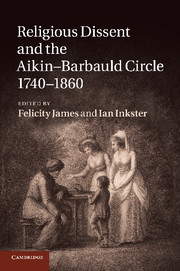Book contents
- Frontmatter
- Contents
- Notes on the editors and contributors
- Foreword
- Acknowledgements
- Chapter 1 Religious Dissent and the Aikin–Barbauld circle, 1740–1860
- Chapter 2 The Revd John Aikin senior
- Chapter 3 How Dissent made Anna Letitia Barbauld, and what she made of Dissent
- Chapter 4 ‘And make thine own Apollo doubly thine’
- Chapter 5 ‘Outline maps of knowledge’
- Chapter 6 ‘Under the eye of the public’
- Chapter 7 ‘The different genius of woman’
- Chapter 8 Lucy Aikin and the legacies of Dissent
- Chapter 9 The Aikin family, retrospectively
- Bibliography
- Index
- References
Chapter 5 - ‘Outline maps of knowledge’
John Aikin’s geographical imagination
Published online by Cambridge University Press: 05 November 2011
- Frontmatter
- Contents
- Notes on the editors and contributors
- Foreword
- Acknowledgements
- Chapter 1 Religious Dissent and the Aikin–Barbauld circle, 1740–1860
- Chapter 2 The Revd John Aikin senior
- Chapter 3 How Dissent made Anna Letitia Barbauld, and what she made of Dissent
- Chapter 4 ‘And make thine own Apollo doubly thine’
- Chapter 5 ‘Outline maps of knowledge’
- Chapter 6 ‘Under the eye of the public’
- Chapter 7 ‘The different genius of woman’
- Chapter 8 Lucy Aikin and the legacies of Dissent
- Chapter 9 The Aikin family, retrospectively
- Bibliography
- Index
- References
Summary
In the memoir of her father John Aikin, published in 1823 shortly after his death, Lucy Aikin wrote of England Delineated (1788), a textbook ‘for the use of young persons’, that ‘few of his works were executed with more pleasure to himself than this’:
[G]eographical and topographical pursuits were always congenial to his taste; in its least attractive forms, knowledge of this kind was welcome to his mind, and when embellished by the charms of eloquence and poetry, a source of high delight. I have often witnessed the admiration with which he perused the description of the site of Constantinople, and the other geographical delineations traced by the masterly hand of Gibbon; and the enthusiasm with which he dwelt upon the splendid panoramas of the ancient world exhibited by Milton in his Paradise Lost, and Paradise Regained.
And commenting on her father’s Geographical Delineations, or a Compendious View of the Natural and Political State of all Parts of the Globe (1806), a more advanced text aimed at those finishing their education, she noted ‘that it is a leading object of this performance to communicate those enlarged views respecting the globe and its divisions, with their various occupations, which may rightly be called the philosophy of geography ’. While the material was compiled from a range of sources, it was shaped by a style expressing the ‘soul and spirit of the work’. ‘Leaving abstruse theories and difficult problems on one hand, and dry details on the other’, the author sought ‘a middle course’ in which ‘the useful and the agreeable’ combined to trace ‘outline maps of knowledge’.
This chapter focuses on England Delineated and Geographical Delineations as cultural texts to consider the character and scope of John Aikin’s geographical imagination. We explore Aikin’s formulation of geography as an educational discipline, raising the subject from its elementary role in Locke’s pedagogy to a form of lifelong learning. This involved extending the scope of the subject, drawing on erudite works which surveyed the natural and social relations of land and life and charted the development of the habitable world, deploying a range of writings, notably topographical poetry and natural history. We consider exchanges between Aikin’s writings and those of other members of his family circle, particularly with his sister, Anna Letitia Barbauld, and children, Lucy and Arthur Aikin. Geography will form the perspective as well as subject of this chapter, in considering the significance for his writings of the places where John Aikin lived and worked.
- Type
- Chapter
- Information
- Religious Dissent and the Aikin-Barbauld Circle, 1740–1860 , pp. 94 - 125Publisher: Cambridge University PressPrint publication year: 2011



